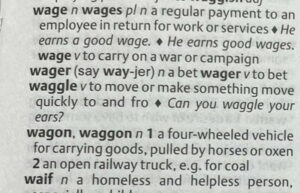 When someone says they have “placed a wager”, we know what they mean. They have placed a bet on their favourite sports market, casino game or other gambling option.
When someone says they have “placed a wager”, we know what they mean. They have placed a bet on their favourite sports market, casino game or other gambling option.
Wagering is something that we associate with gambling today in an automatic way. But has this always been the case?
What is the origin of the words ‘wager’ and ‘wagering’? Furthermore, does it have any other meanings that remain in use today? Or have other explanations of the word faded into obscurity?
That’s what we’re here to find out today.
You may engage in wagering at any number of gambling sites today, but has this always been the word’s meaning? Let’s have a look at the etymology, dictionary description and more. Find out all about the word ‘wager’ in this article.
The Dictionary Description

Turning to a dictionary is always a good idea when looking at the explanation of a word. The Cambridge English Dictionary has a couple of definitions relating to ‘wager’.
They are as follows:
Wager (noun)
An amount of money that you risk in the hope of winning more, by trying to guess something uncertain, or the agreement that you make to take this risk:
- She put a cash wager of £50 on the race.
- He tried to eat 50 hard-boiled eggs, for a wager.
Wager (verb)
to risk money by guessing the result of something:
- More than $2 billion was wagered legally on sports in Nevada in the last 12 months.
- He is so confident of victory he has wagered on himself.
To wager is also to suggest as a likely idea.
A Look Back in History

The etymology of the word ‘wager’ suggests that it came from Middle English. At that time, the words wajour, wageour and wager were in use. Each of these words stemmed from the Old Northern French ‘wageure’. That in itself came from another French word, ‘wagier’, meaning ‘to pledge’.
You can also dig deeper into this explanation. As a noun, there are four descriptions that have come into being throughout history. They are as follows:
- Something deposited, laid, or hazarded on the event of a contest or an unsettled question; a bet; a stake; a pledge.
- That on which bets are laid; the subject of a bet.
- (law) A contract by which two parties or more agree that a certain sum of money, or other thing, shall be paid or delivered to one of them, on the happening or not happening of an uncertain event.
- (law) An offer to make oath.
To get to the origins of the word though, we need to go back to the 14th century. Those Middle English words were in use, with people making solemn pledges this way. Wager evolved throughout the proceeding years to relate to betting. Of course, wagering/betting itself goes back even further than this word. All the way back to Ancient China and 2300 BC.
Use in Modern Day English
 There is little more information on the origins of ‘wager’. Other than coming from Middle English, it has had little alteration over the years. Today, it remains effective in relation to gambling. Of course, if you make a wager, you are pledging your money to a certain outcome. Therefore, it has kept the general meaning from those early days. It isn’t uncommon to hear a gambler using phrases that feature the word.
There is little more information on the origins of ‘wager’. Other than coming from Middle English, it has had little alteration over the years. Today, it remains effective in relation to gambling. Of course, if you make a wager, you are pledging your money to a certain outcome. Therefore, it has kept the general meaning from those early days. It isn’t uncommon to hear a gambler using phrases that feature the word.
‘The Wager‘ is also the name of two different films. The first came about in 1998, serving as a short film directed by Aaron Woodley. It stars Peter Blais and Barclay Hope, while Valerie Boyle was the executive producer. The Wager is a dark and humorous suspense drama, beginning late one night. It sees Richard enter his apartment where he encounters a strange man. The man holds a box and proposes a series of morbid wagers, relating to what is inside the box. Each of them is more disturbing than the last, leading towards a life-or-death gamble.
The second of these films came out in 2007, serving as a Christian drama film. Directed by Judson Pearce Morgan, it stars Randy Travis and Jude Ciccolella. The Wager bases itself on a novel of the same name, written by Bill Myers. The storyline sees actor Michael Steele (Travis) at the height of his career. He is cast in the role of a lifetime, which tells the story of a monumental conflict. Gossip about him is high, and this may cause him to stumble on the path of righteousness. His marriage is also in jeopardy. Steele needs to find the courage and conviction to straighten out his life.
The 2007 film released on June 27 in theatres. It was also released to churches by Outreach Cinema. It was also one of 14 Christian films featured at the 2008 Gideon Media Arts Conference and Film Festival. It did not receive positive reviews from critics, though.
With regard to gambling today, ‘wager’ is just another way of saying ‘bet’. Nothing more and nothing less in all fairness. When you wager on something, you are always risking a certain amount of your money. In some instances, you may not even be risking money. Some people have friendly wagers with one another for a case of beer or a favourite possession, or even just for pride. It’s exactly the same as having a bet with someone, only a different word is in use for it.
As is the case with any kind of wagering/betting/gambling, you need to know what you’re doing. Learn the rules of a wager and everything surrounding it before proceeding. You know that with any wager, there is risk involved. You shouldn’t ever pledge your money to something like this if you know you cannot afford it. Only wager with money that you can afford to lose.